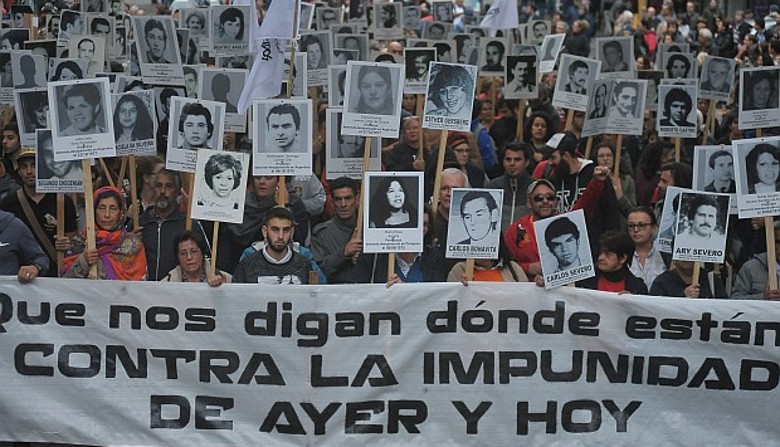As it became known days ago, the Spanish justice system is evaluating the extradition request made by Uruguay against the military doctor Carlos Américo Suzacq Fiser for crimes against humanity.
In June, the Spanish authorities arrested 72-year-old Suzacq in Madrid, the city where he has lived for a long time. On him weighed, since November 2021, an international arrest warrant issued by Interpol requested by the Uruguayan prosecutor specializing in Crimes Against Humanity.
The crimes for which he is accused are abuse of authority, serious injuries and deprivation of liberty. Suzacq worked as a doctor for the 6th Mechanized Cavalry Regiment known as “the sixth cavalry”, a detention and torture center of the last Uruguayan dictatorship (1973-1985) which operated under the responsibility of the Army and the Anti-subversive Operations Coordinating Body (OCOA). ) and that was located in the neighborhood of Piedras Blancas. This regiment functioned as a torture center between 1972 and 1984 . In that place, Suzacq carried out “advisory tasks” that included supervision of torture with the aim of obtaining the confessions of the detainees: “As a consequence of the confessions obtained through the use of violence, convictions were obtained from those interrogated and from third parties ” says the accusation drafted by Prosecutor Ricardo Perciballe, in charge of the special prosecutor’s office.
According to multiple testimonies, Suzacq’s main task was to determine to what extent the detainees could continue to be tortured or when they had to stop so that they survived for further interrogation. In this way they were able to optimize the obtaining of information. The Spanish Public Ministry expressed its agreement with the extradition through a report that recounts 8 cases of detainees that confirm the presence of the doctor in the torture sessions.
One of these accounts is that of AMMN, a woman who recounts how she was taken into custody to a headquarters of the 6th Mechanized Cavalry Regiment, where they stripped her and hooded her, tied her ankles with wire, applied an electric prod to her, and threatened her with ” burn her with acid or shoot her.” The witness affirms that after these torments they warned her that they would continue with her martyrdom if she did not sign an act declaring that she was not pregnant even though she was.
A path to peace and democracy
For its part, the organization of Relatives of the Detained-Disappeared sees the possible extradition of Suzacq as positive but warns about the prolonged period of impunity and the presence of local actors who still deny the crimes. Diario La R spoke with Javier Tassino, a member of Familiares and brother of Oscar Tassino, a communist militant and trade unionist who has been missing since July 1977.
“This type of news is encouraging, on the one hand, due to the fact that there is a part of justice that does what it has to do, that clings to justice, that studies, that analyzes, that has evidence and presents it” says Tassino but regrets that “there is another party that is pulling back, as in the case of the women who denounced 100 people and only one went to jail” she comments in reference to the case of the multiple complaints filed by a group of former political prisoners in 2011. Tassino commented to Diario La R that “the time that has passed and this doctor is walking around Spain is the same as a number of soldiers involved in this type of crime that are around the world escaping from justice. ” remarks the militant.
The member of the Familiares organization warns about the coexistence of another justice that protects the repressors: “in several military cases they were summoned by the justice system and they did not go. Commonly if you are summoned to a court and you do not go, the next day they will look for you at your house ”denounces Tassino.
For Tassino it is about finding “the path to peace and justice” but the problem of impunity is aggravated by the existence of local actors who claim the dictatorial period: “here we also have sectors linked to them, either because they were comrades in arms or for agreeing with this brutal aggression towards the whole of the town where thousands suffered torture”, he stated. Regarding the case of Suzacq, Tassino ends by saying that “this doctor has enjoyed impunity for all these years and we hope that they bring him and he will go through justice as he has to go through” he concludes.
The González González case
One of the emblematic cases is that of Luis Eduardo González González, a young student, worker and militant of the Revolutionary Communist Party (PCR) who was arrested along with his wife Elena Zaffaroni, 4 months pregnant, in December 1974 and transferred to the ” sixth cavalry. Different testimonies indicate that González was tortured (many times along with his wife) beginning on December 13, 1974 and under Suzacq’s supervision. Elena remembers that on December 24 of that year they were allowed to hold hands and that was the last time she heard from him.
The Commission for Peace created by then President Jorge Batlle in order to clarify the truth about the crimes of the dictatorship (2003) says in its final report that González died on December 26, 1974 due to the torture received. For its part, the report of the Armed Forces delivered to the President of the Republic (2005) does not specify the date of death but indicates that it occurred at the end of December 1974. From the human rights organizations it is expected that Suzacq will appear before the Uruguayan justice and provide information about the fate of González.
The Inter-American Court of Human Rights found the Uruguayan State guilty for the disappearance of Luis Eduardo González, Oscar Tassino and for the case known as the “April girls” where 3 young women were murdered in an operation by the Joint Forces.
Located
After the dictatorship, Elena Zaffaroni sent a letter to Suzacq with no luck in which she asked him about what happened to her husband and another survivor of the “sixth cavalry” and even managed to locate him through the Spanish telephone directory. On that occasion, Suzacq answered the phone but claimed that he does not remember anything about the events referred to because he was too young at that time. Beyond this, he confirmed his presence in the detention and torture center. In November 2021, the Spanish justice system proceeded with the extradition of Crel. Retired Eduardo Ferro (today in prison) to Uruguay to answer for the Case of Oscar Tassino. Now the National Court of Spain has set the date for the resolution on the Suzacq Fiser case for next Wednesday, January 11.







